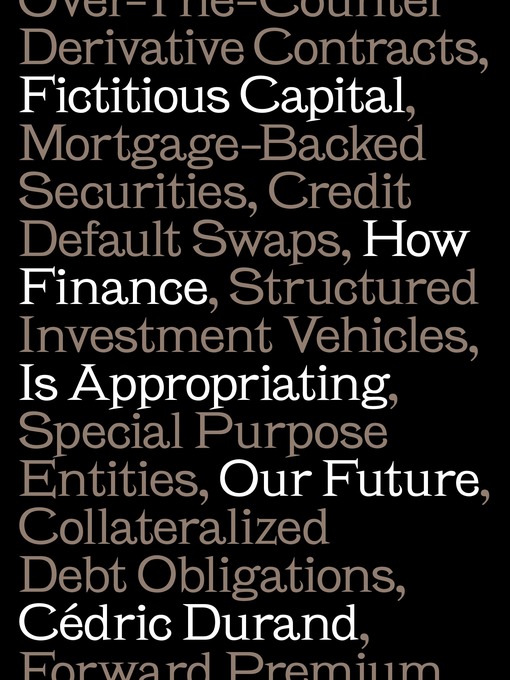The 2007–08 credit crisis and the long recession that followed brutally exposed the economic and social costs of financialization. Understanding what lay behind these events, the rise of “fictitious capital” and its opaque logic, is crucial to grasping the social and political conditions under which we live. Yet, for most people, the operations of the financial system remain shrouded in mystery.
In this lucid and compelling book, economist Cédric Durand offers a concise and critical introduction to the world of finance, unveiling the truth behind the credit crunch. Fictitious Capital moves beyond moralizing tales about greedy bankers, short-sighted experts and compromised regulators to look at the big picture. Using comparative data covering the last four decades, Durand examines the relationship between trends such as the rise in private and public debt and the proliferation of financial products; norms such as our habitual assumptions about the production of value and financial stability; and the relationship of all this to political power.
Fictitious Capital offers a stark warning about the direction that the international economy is taking. Durand argues that the accelerated expansion of financial operations is a sign of the declining power of the economies of the Global North. The City, Wall Street and other centres of the power of money, he suggests, may already be caked with the frosts of winter.
-
Creators
-
Publisher
-
Release date
June 6, 2017 -
Formats
-
Kindle Book
-
OverDrive Read
- ISBN: 9781784787219
- File size: 1957 KB
-
EPUB ebook
- ISBN: 9781784787219
- File size: 1957 KB
-
-
Languages
- English
-
Reviews
-
Publisher's Weekly
March 27, 2017
Radical scholar Durand’s first book investigates the terrifying, amoral nature of finance and its untenable role in contemporary neoliberal society. His primary argument involves a critique of “fictitious capital.” He defines this as “claims over wealth that is yet to be produced... a growing pre-emption of future production.” Fictitious capital emerges, at least in the current economic context, out of a long process of financialization, the “reorientation of capital accumulation away from productive and commercial activities toward ones concerning finance.” No longer is the economy based around labor or manufacturing products, he writes, but rather “debts, shares, and a diverse array of financial products.” Durand decries how government intervention allows fictitious capital to “assume proportions incompatible with the real production potential of economies,” which “will inexorably lead to crisis.” This is all to say that the state allows for this system’s cyclical failures, shielding financial service providers while harming everyone else. Durand’s analysis is heady, requiring frequent digressions to explain his terms, but this is to be expected. Durand is a scholar through and through; where one might expect polemic, there is instead cogent analysis. This even-handedness, far from reassuring, makes his argument all the more powerful and his diagnosis all the more dire.
-
Formats
- Kindle Book
- OverDrive Read
- EPUB ebook
subjects
Languages
- English
Loading
Why is availability limited?
×Availability can change throughout the month based on the library's budget. You can still place a hold on the title, and your hold will be automatically filled as soon as the title is available again.
The Kindle Book format for this title is not supported on:
×Read-along ebook
×The OverDrive Read format of this ebook has professional narration that plays while you read in your browser. Learn more here.

